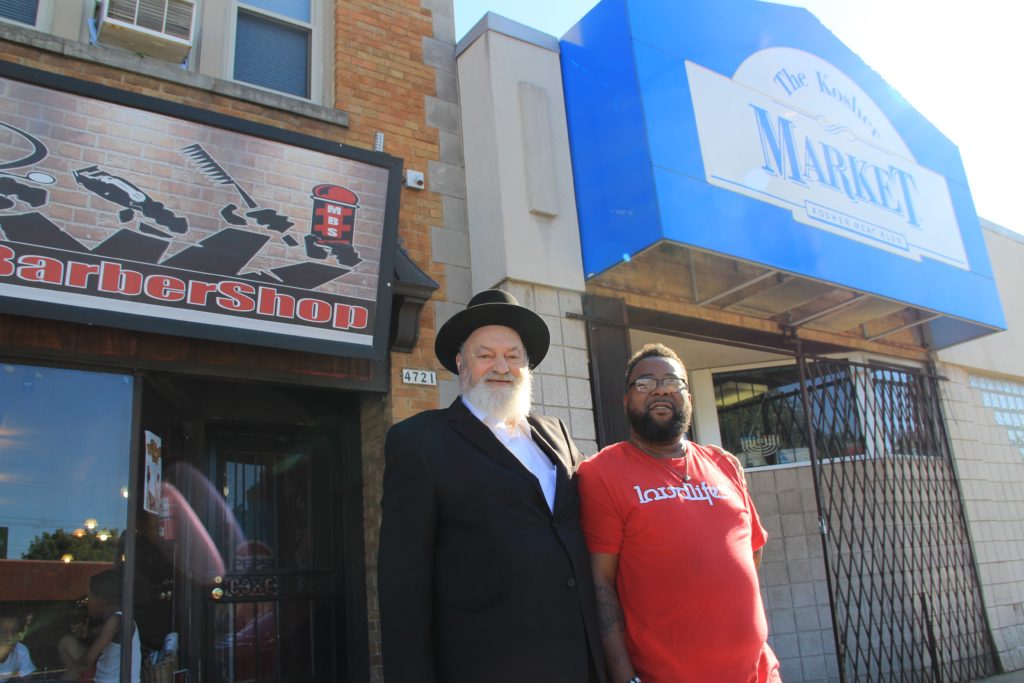MILWAUKEE – For 40 years, the Kosher Meat Klub in the Sherman Park area has never had anybody come in, hold the place up and make off with the cash, said Rabbi Dovid Eisenbach, the proprietor.
“I’ve never felt threatened here,” added Marcia Eisenbach, who owns and operates the business with her husband Dovid.
The Sherman Park area is a great, quiet place to live with good people, both Jewish and non-Jewish, and the Milwaukee riots over the weekend of Aug. 13 should not give or solidify a different impression. That’s how some who live and work in the area see the aftermath of the riots that left several nearby businesses burnt-out or looted.
The BP gas station at 3114 N. Sherman Blvd., emblematic of the riots thanks to video of it burning, is about a half-mile from Congregation Beth Jehudah, a longtime anchor for the Jewish community in Sherman Park.
Nearly across the street from the Kosher Meat Klub, at Clark’s Beer & Liquor Mart, 4728 W. Burleigh St., there were at least 50 young people entering through shattered windows and looting the place, according to the owner, who has watched the store security video. Many had T-shirts wrapped around their heads.
Tom, the Clark’s owner who declined to give his last name, said he’s gotten calls, letters and cards of support. “It’s been great,” he said. “The people in the neighborhood are good people.”
Rabbi Benzion Twerski, of Congregation Beth Jehudah, 3100 N. 52nd St., agrees. He talks of his appreciative congregants giving cookies to the police and of non-Jewish neighbors visiting an observant home to help with something on Shabbat.
“There’s a very strong religious black representation. It’s very close-knit. We have a church across the street from us with two black pastors, wonderful people,” Twerski said. “Everybody works together.”
“The community has always been able to work together,” echoed Marcia Eisenbach in a separate interview. “The truth is that Sherman Park is a stable community.”
There are constant meetings among community stakeholders, offering interaction all the time, Twerski said. Soon after the riots, he was part of a private meeting at the synagogue with some shul activists, three aldermen, a police captain and representatives from the Sherman Park Community Association, he said.
“At that meeting there just was a tremendous energy, a tremendous positive energy,” Twerski said. “The perception of the neighborhood is a very negative rap and it’s just a fabulous place to live. It’s a great place to live. The value for homes is excellent.”
Gerald Glazer, who has lived in Sherman Park since 1952, has been active in neighborhood initiatives to beautify the area and to establish businesses there. “A tragedy,” he said, referring to the riots. “It’s a setback all the way across the board.”
He fears it could cause some people to move out. “I don’t believe the Jewish community was in any way a target of the crimes but it has adversely affected everybody who lives in the neighborhood, including the Jewish community,” he said.
Rabbi Peter Mehler, who lives in the area, tells a story of a neighbor loudly searching for her lost keys late in the evening. He walked over and asked for a lower volume, indicating the street is one with families and people who have to get up in the morning. He helped her find the keys.
“Yes, we do have our challenges,” Twerski said “It’s really, thank G-d, a thriving, vibrant community and we hope to keep it that way.”



